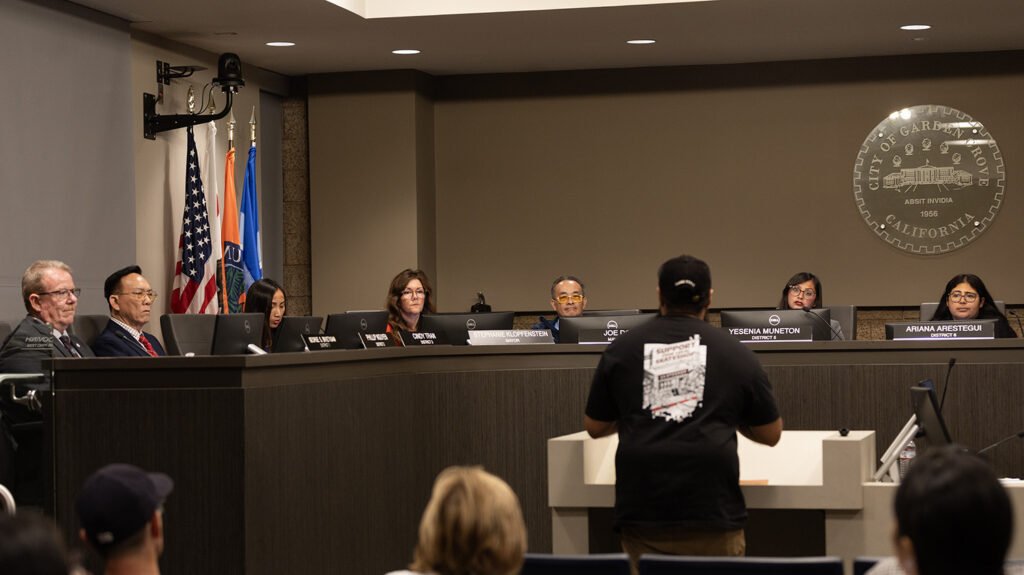In the heart of Garden Grove—where vibrant Little Saigon meets the sprawling suburban landscape—a palpable tension hung in the air as local city council members faced a community divided. Recent deportation sweeps targeting day laborers have sent shockwaves through a community long accustomed to navigating the fears and complexities of immigration enforcement. Amid growing pressure from constituents, the council’s decision to table a vital resolution garnered reactions that reflected both fear and frustration.
Garden Grove City Council Divided on Response to ICE Raids
During a heated city council meeting on July 8, 2025, members contemplated a resolution initially adopted in 2017, reaffirming that local police would not engage in federal immigration enforcement. Yet, just as the stakes seemed highest, Mayor Stephanie Klopfenstein announced that the council would not act, stating, “I don’t feel that we are ready as a body to move forward on this, this evening.” The council’s indecision came amidst public outcry following reports that U.S. Immigration and Customs Enforcement (ICE) had targeted day laborers at a local Home Depot.
The Voice of the Community
Constituents packed the council chamber, many calling for a firm stand against what they described as “unjust raids.” Council members Yesenia Muñeton and Ariana Arestegui offered dissenting votes, arguing it was crucial for the council to send a clear message to a community in distress. Arestegui emphasized, “It’s about the public in our city trusting us and where we stand as a collective body, knowing that these are the values that we have.”
This sentiment resonates broadly across immigrant communities in Southern California. According to a hypothetical study by the California Immigration Alliance, 76% of immigrants in Orange County reported feeling less secure due to recent ICE activities. “We need our local leaders to stand up and protect us,” asserts Dr. Elena Ramirez, a sociologist who specializes in immigrant rights. “Their silence sends a message that this fear is justified.”
Controversy Within the Council
The council meeting crystallized divisions among members. Councilman George Breitigam cautioned against adopting the resolution, claiming it might invite further ICE scrutiny. His perspective highlights the unease regarding the political and legal ramifications of engaging with federal immigration issues. “We’ve had less than six incidents in Garden Grove,” he stated, suggesting that confronting ICE could escalate tensions. “If we pass something like this, it is going to go dramatically up,” he warned.
In contrast, Councilmembers Muñeton and Arestegui stressed the immediate need for action, emphasizing that a mere symbolic gesture could foster a sense of safety among residents. During the debate, Arestegui pointedly remarked, “There have been more than six incidents of ICE activity in our city, and we can’t ignore the reality these families face.”
- Community Concerns: Recent ICE sweeps have left residents feeling vulnerable and anxious.
- Political Tensions: Council divided over how best to respond to federal enforcement without provoking further deportations.
- Call for Action: Some council members advocate for a resolution to reaffirm protections for immigrants.
The Broader Context
Garden Grove’s struggle is not isolated. Nearby cities like Santa Ana and Anaheim have embraced more proactive measures, allocating hundreds of thousands in taxpayer dollars to support immigrant defense funds and legal services. The stark contrast invites questions about what it means to lead a diverse community in times of crisis. “Cities that take a stand against ICE often find stronger community bonds as a result,” Dr. Ramirez points out, indicating that solidarity can breed resilience.
As this local drama unfolds, residents like Christine Lopez Ediss are left pleading for support amidst fear-driven silence. “What have you done? Where is the commitment to the community?” she lamented during the council meeting. Her words echo a growing sentiment that trust must be built—not only through policies but by the visible actions of elected officials.
Future Implications
The council’s choice to table the resolution deeply concerns immigrant rights advocates and local residents who fear the implications of inaction. The psychological toll of these ICE raids on families can lead to long-term trauma, exacerbating issues of anxiety and displacement. A report from the National Institute of Mental Health suggests that even the threat of deportation can significantly impact mental health among immigrant communities.
While Garden Grove grapples with its indecision, the clock continues to tick. Local leaders must acknowledge that their choices resonate far beyond the confines of the city council chambers. Every moment spent debating, each failure to act, risks further alienating the constituency they are meant to serve.
In the midst of this turmoil, activists are primed to mobilize. With community-led forums promoting resilience and safety measures, it’s clear that public engagement will play a critical role in shaping the future. In the coming weeks, organizers plan to launch educational workshops aimed at ensuring residents are aware of their rights and available resources.
As the dust settles on the contentious council meeting, it remains to be seen whether Garden Grove’s leaders will find the courage to act decisively or whether they will remain mired in caution. For families living in fear, the stakes could not be higher—each day represents not just a home, but a heartbeat, a life lived in uncertainty.





